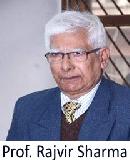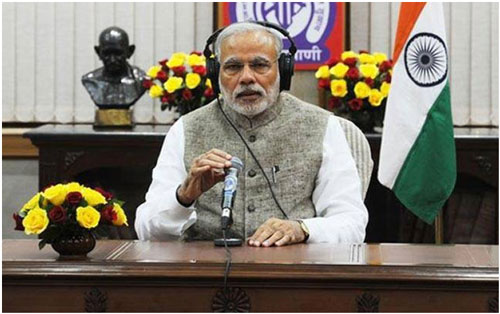 The programme – Man ki Baat- has completed three years of its life. It gives us an occasion to look back to know the purpose it was started with and the extent to which that purpose is achieved.
The programme – Man ki Baat- has completed three years of its life. It gives us an occasion to look back to know the purpose it was started with and the extent to which that purpose is achieved.
Prime Minister Modi began this initiative to be in touch with the people of India continually to interact and share his views with them. It was also conceived perhaps to usher in a new strategy to change the ways of looking at the matters, problems and opportunities differently than how we looked at them in the past.
In fact it may be taken as a new initiative for change with the use of psycho-social-cultural and spiritual tools. Though it requires the efforts of a research scholar to collect all the contents of Man ki Baat held 36 times so far and engages in content analysis, but it can be asserted that Modi has undeniably tried to activate the heart and soul of every Indian, specially the youth, the empowered in every respect specially in terms of intellectual and economic capabilities to come forward to contribute in nation building and in solving the problems of disparities, discrimination, deprivation and exploitation.
In other words he has been trying to bring out the human side of a man and arouse the sense of nar seva, narayan seva at every level of the community from city to the village with exhortation to millions of them to think and act accordingly.

Spritualising the solutions to poverty, hunger and other social challenges, he thinks, can go a long way in reconstructing a new society, a new economy and a new India finally. Such a behavioural change at all levels from political, bureaucratic, social, industry as well as business, in his opinion, can bring a sea change in the socio-economic arena of the country.
He is trying to invoke cultural and spiritual heritage, the national consciousness, wherein helping the helpless and sharing the blessings of god in the form of richness of resources and capabilities with anyone for the welfare of the mankind is the greatest act of worship.
He knows the impact of such exhortations may not be quick and hundred percent, vast in magnitude and scope, but if that could change the behaviours of even a friction of India’s people, it can serve as a model for reshaping the social fabric of India. Not long ago, and in some parts of rural India even now, the gifted sections of the village people used to pool their resources, singularly and collectively both, to share the expenditure of the marriage of the daughter of a poor villager, specially belonging to the lower strata of the society.
Modernism and modernization has affected that relationship quite adversely. Modernization has come to mean individualism in all respects from market to home. A visible shift from WE to ME in thought and action gave rise to selfishness, crime, greed, corruption and decline in the overall value system established and nurtured so well by our ancesters.It is for this reason, one may think that many a time the Prime Minister insists on humanizing the society and polity of the nation.
Modi has referred to his Beti Padhao, Beti Bachao campaign many times in his Man ki Baat in order to appeal to the soul of the nation to deepen the concern for gender justice or for removal of gender discrimination by way of placing the issue at the centre of the social psyche for righteous action if India wants not merely tore- claim its old heritage to value and honour woman where the place of worship of woman was considered the place of deities along with many other such references available in the scriptures of India.
He is certain that democracy will not move away from its formal character to be substantive one without the empowered and dignified life of women and the weak. Peace and progress are envisioned by him as integral to ensuring equal and just environment for the women of India. But pause foe a while. Will this appeal bear fruition? Will people listen to fight against crime against women?
The episode that encouraged me to write this piece was the Man ki Baat broadcast on 24th September. Without going into the details of the entire address, it is to recall two of the components of his address. One, he made a specific mention of Nidhi and Sweta, if remembered correctly, who after the martyrdom of their husbands in the fight against terror, decided to join Army and serve the nation to redeem the dreams that their husbands saw.
He gave two messages to the nation at the same time. One that women are no where behind in the spirit of sacrificing for the nation and two that woman of India are capable of undertaking any responsibility including the hard ones as of the Army. In fact, these examples were there not to inspire any one section, but the whole of the nation, specially the youth of the country to engage themselves in whatever field of activity they are to keep the nation first.
The second most important aspect of the talk of the Prime Minister was his frank views on social and national unity when he said Anekta Mein Ekta should move beyond a ritualistic exercise repeated often by the leaders-social, political, cultural or others and that vividhta mein ekta( unity in diversity) should not be used for either gaining power or to retain it, it should become an integral part of our daily life instead.
Exemplifying his views the Prime Minister explained that one should go to different parts of India not for the sake of change or entertainment only but to understand the geographical, social, cultural and economic characteristics of the people over there. Go there as a student and not just as a tourist, he appealed to feel the diversity, experience the anekta and appreciate and document that diversity. Share your learning and knowledge with others when back home the qualities of the blossoming garden that is India. In the end, he said vividhta mein ekta should come of its political avatar but make that a part of life to make one India, strong India and peaceful and developed India.
In a way he is aiming at the change of mind set both within and outside government. He would succeed too if no distance is allowed to creep in between the prescription/preaching and practice. Still one can conclude that, Modi is trying to take the matter of governance from mere technical to moral and transparent exercise at all levels.
(The writer is senior consultant, IGNOU)
